Saving the news
Klein student journalists, faculty tackled the pandemic
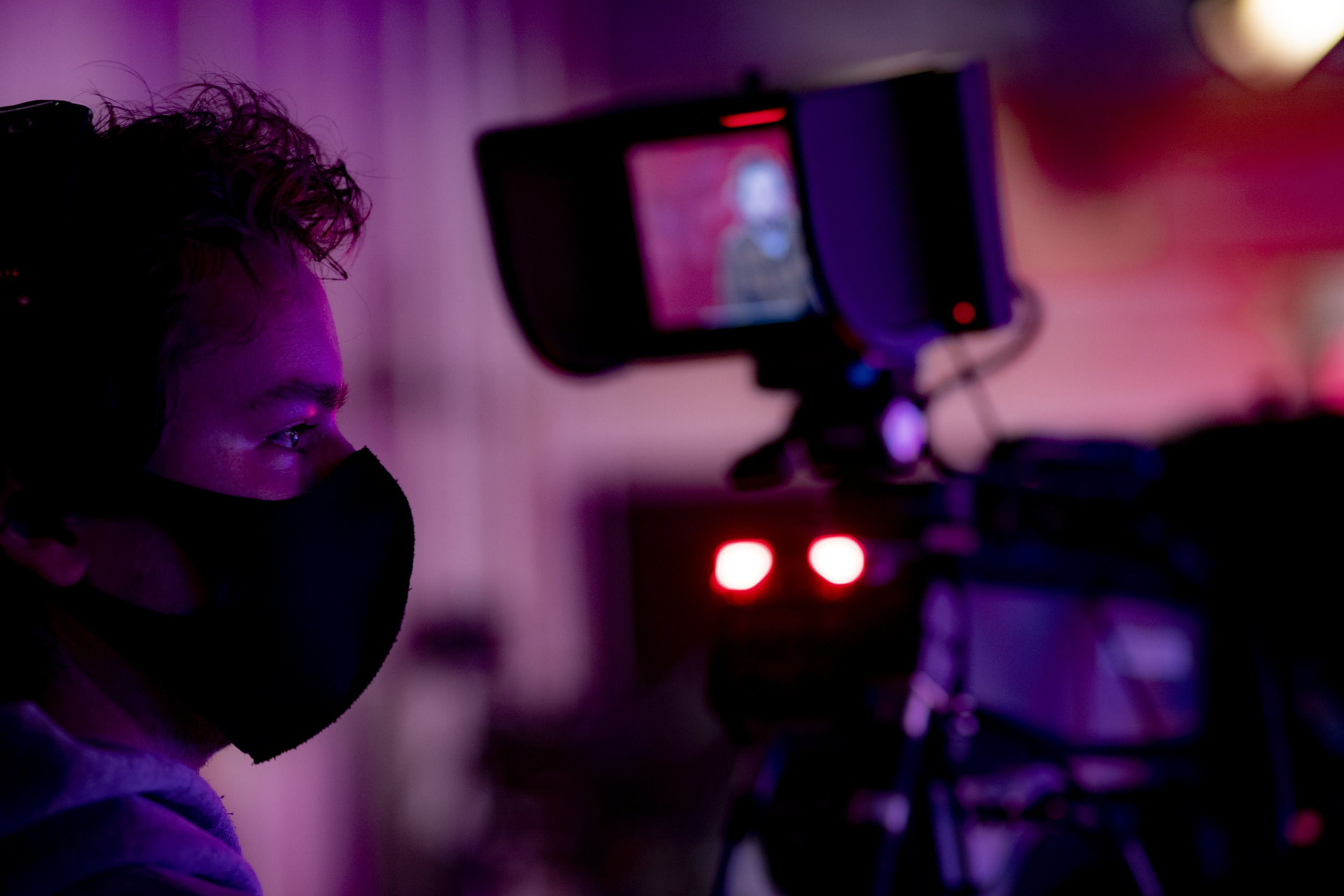
Temple’s student media is the eyes and ears of the student body. When all went dark in March 2020,
they found new ways to communicate.
In early March 2020, everything was going according to plan for Madison Karas, Class of 2022, then a sophomore studying journalism in the Lew Klein College of Media and Communication.
A double major in economics and journalism, Karas had earned a role as a features editor for The Temple News. She lived just across the street from the paper’s office at the Howard Gittis Student Center, and would shuttle back and forth at all hours, spending entire Sundays and Mondays hustling to get the print edition ready for Tuesday.
During what was supposed to be, for Karas, a relaxing spring break in Miami, COVID-19 swept the nation and it all began to change. One by one, universities across the country closed the doors to their physical classrooms and moved courses online. Karas and other staffers at The Temple News reassembled in the newsroom to contingency plan, then fanned out to campus spots like Beury Beach to interview fellow students about how they were feeling.
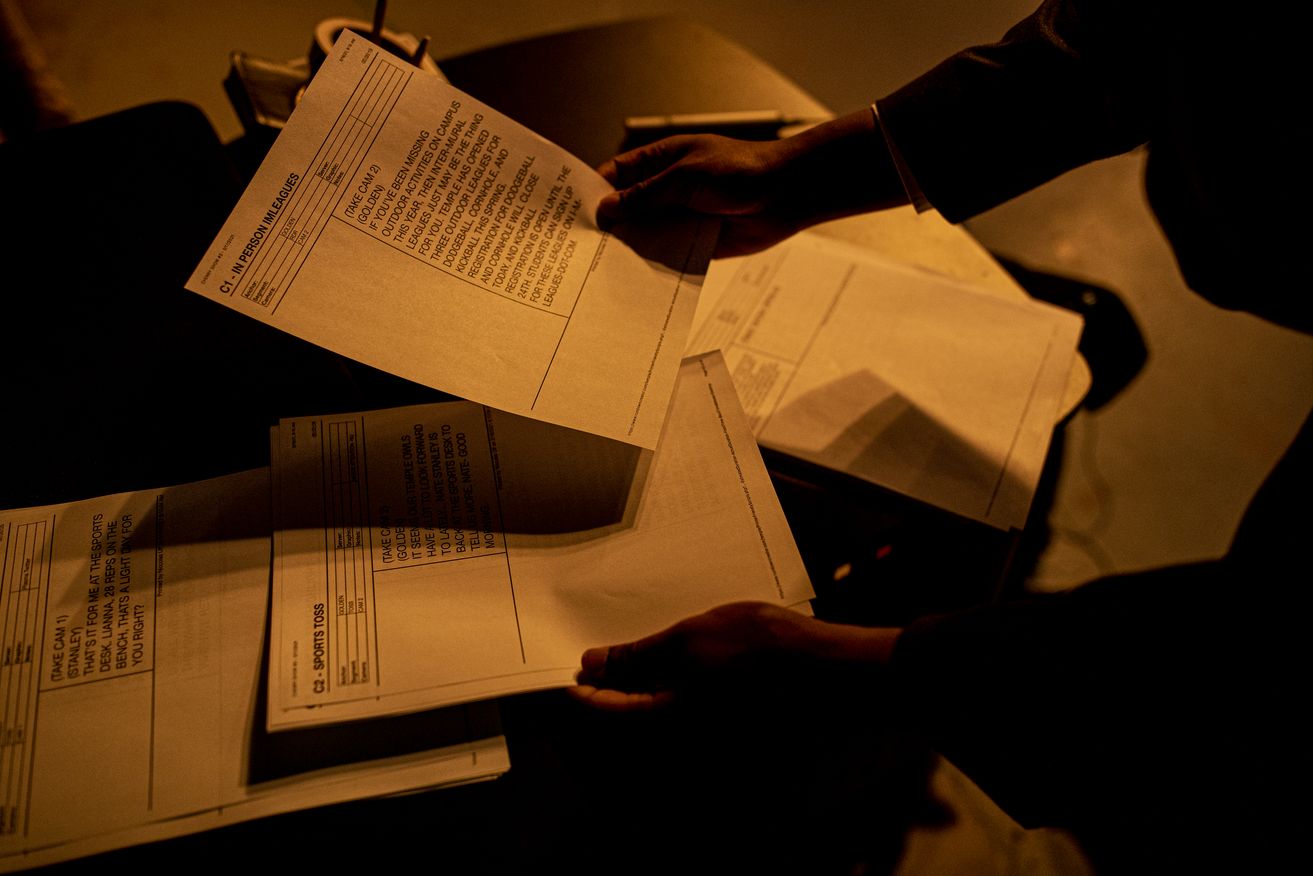
The reporting served as the lead story for what would become the paper’s last print edition until the following fall. On March 11, Temple announced it too would be going virtual. Karas had no way of knowing that would mark only the start of one of the most tumultuous years in The Temple News’ nearly 100-year history, and the most exhausting she had ever experienced. That May, she was named editor-in-chief of the paper. The responsibility now lay on her shoulders.
“It was definitely a scary and stressful moment, as a student and as a person,” Karas recalled. “There was a lot of uncertainty,” she said, after leaving her dorm and moving in with family friends in Philadelphia.
Yet, the work Karas performed over the following year to adapt to a new reality was indicative of a wider resiliency across Klein. Students and professors in various media programs—TUTV-Temple University Television, WHIP Radio, Temple Update—all found themselves adapting to meet the new challenges.
The work also suddenly felt more urgent, more real. As communicators and journalists, they were now the gatekeepers between a world of pandemic-induced uncertainty and a university community desperate for answers and connection.
“They’ve been through a really excruciating experience in terms of learning how to become reporters, but I think they came through it remarkably,” said Arlene Morgan, assistant dean for external affairs at Klein. “They acquitted themselves pretty well.”
“We needed to be colleagues to get work done, and also needed to be humans to each other as young students living through a national crisis trying to accomplish a public service.”
For Karas and The Temple News, it meant a lot of quick decision-making. The paper assembled breaking news teams to stay on top of the latest COVID-19 announcements by the university, city and state. Once she got the top job, Karas began to on-board staff remotely, working out how to organize a team dispersed across the country. The paper launched trackers for COVID-19 cases at Temple, and later vaccinations in North Philadelphia.
Then in May 2020 came the murder of George Floyd in Minneapolis and subsequent protests across the country. A native of the Twin Cities, Karas penned a poignant opinion piece for the Philadelphia Inquirer about watching the events in her hometown from afar. In the fall, she and The Temple News crew worked to get the print edition back up and running at the same time the presidential election was heating up. In January came the unexpected passing of John Chaney, the legendary Temple basketball coach. In between were the daily trials and tribulations of online coursework and several moves between her hometown of Minneapolis and around Philadelphia. Many peers shared her experiences and stress, creating an unprecedented need for heart-to-heart talks between student journalists as well as faculty.
“It was important for us as a student newsroom to find connection and support each other,” Karas said. “We needed to be colleagues to get work done, and also needed to be humans to each other as young students living through a national crisis trying to accomplish a public service.”
Quarantine, Day 1
It’s a stark gray background: the corner of a room, nothing adorning the walls.
Temple student Megan Lowery, KLN ’20, peers into the camera, her face lit by a single light source.
Her eyes and voice reveal fatigue, frustration and fear.
“COVID-19 is really scary for someone who has respiratory issues already,” Lowery says. “I’ve had really bad asthma since I was 4 years old. Sometimes I can’t even get up a flight of steps without using my inhaler.”
As the video rolls on, the camera cuts away. There’s an empty bread aisle at the grocery store. Lowery’s gloved hands wipe down the handles of a shopping cart. Next, there are shots of her doing jumping jacks, reading a magazine and looking despondently into her cell phone as she is confined to a small bedroom.
It’s the first installment of a Quarantine Diary, filmed in spring 2020 by students enrolled in the TUTV Practicum course of Paul Gluck, a Klein professor and general manager of the student-run television station.
Normally, students in the course are putting together and refining all of the skills learned so far. They’d be in the station’s large studio (comparable in size to the professional studios at local stations 6ABC and CBS3) in Annenberg Hall for 16 weeks, producing a variety of programs: talk, game show, music, comedy and live broadcast.
“All that happens within the four walls of our studio,” Gluck said. “Now that’s not available. So how do we make a course of value?”
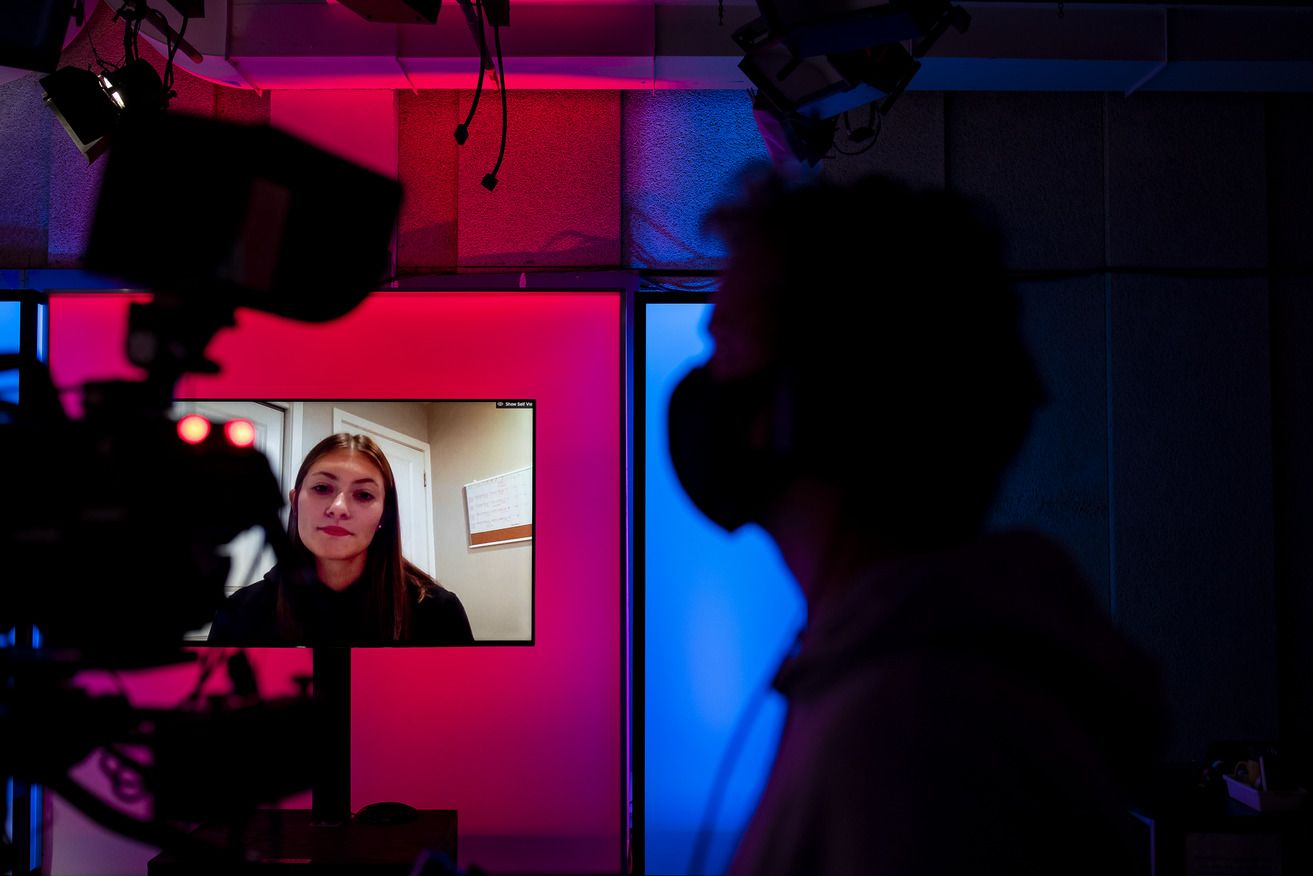
The Quarantine Diaries, which aired in two parts online and on television, were a key adaptation. Most of Gluck’s students already had the laptops, software and digital SLR cameras needed to produce video in their own environments. Creating the diaries allowed them to refine traditional skills in collecting footage and editing a video package. But it also allowed them to find their own creative styles.
"No matter the venue, the storytelling is the most important element."
Some students, like Lowery, opted for a more documentary-style film, focusing on the drama of their lives in blunt terms. Ravyn Johnson-White, KLN ’20, used graphical elements to show the spread of COVID-19 through charts and animations. Another student created a humorous, silent film-style piece making light of his ability to still be late for a Zoom-based class despite only being a few feet away from his laptop.
What connected them all was the ability to still tell a story, even though their former in-person campus routines had been cut short.
“No matter the venue, the storytelling is the most important element,” Gluck said.
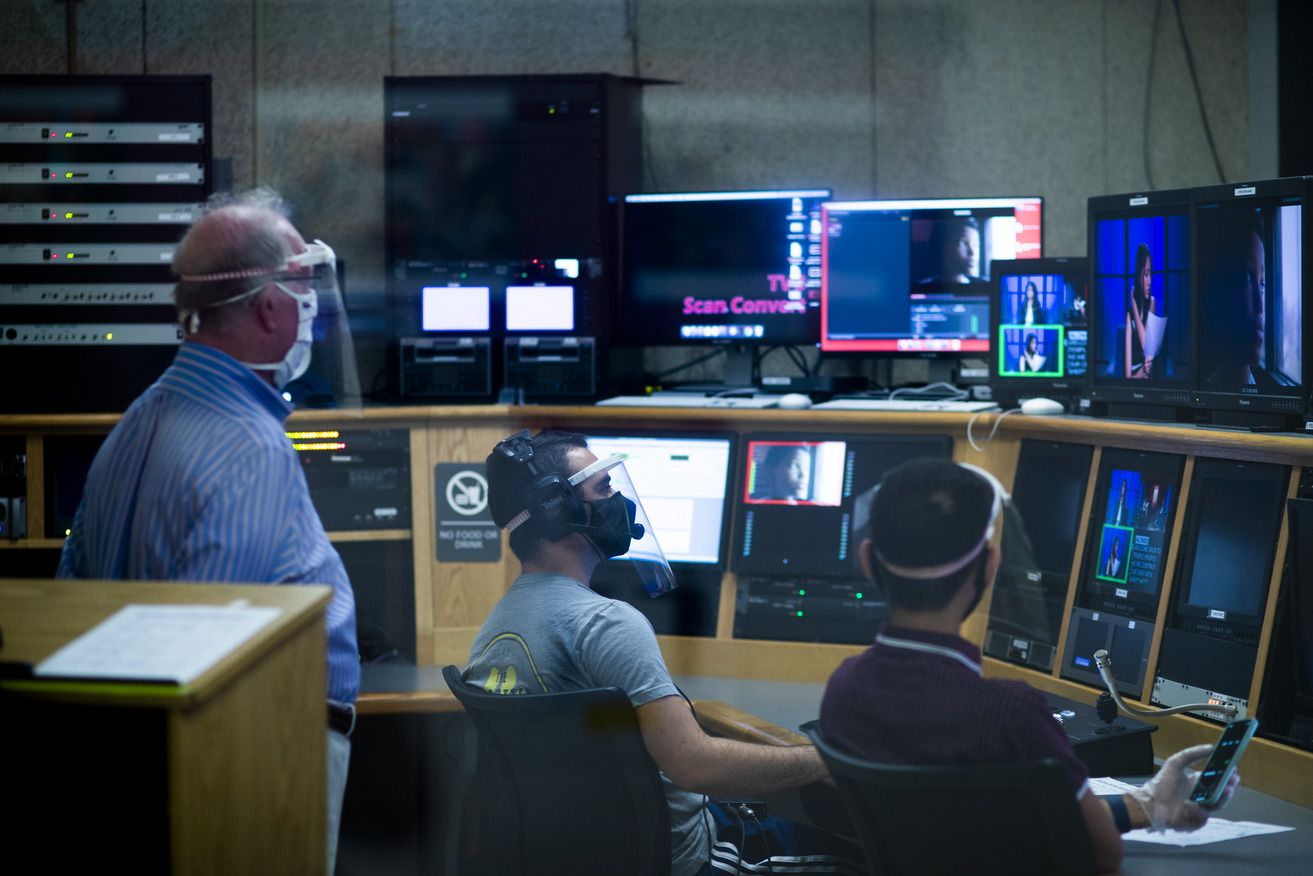
In addition to the Quarantines Diaries, TUTV staff and students provided service programming to viewers. Staff Producer Ed Dress, KLN ’82, and Student Editor Brian Mathews worked with the College of Education and Human Development’s Center for Media Literacy to create a series of short vignettes called Advice from the Classroom, which provided best practices to parents on how to facilitate early education for children stuck at home.
TUTV Assistant General Manager George Cummings, KLN ’78, developed a special children’s programming block for pandemic audiences. Among other offerings, the block repurposed Captain Noah and His Magical Ark, which originally aired in the Philadelphia region during the 1970s.
“Not only was it educational and informational, but it transcends generations as entertainment,” Gluck said. “We knew that in the same room, 4-year-olds and their 45-year-old parents, or grandparents, could enjoy it as well.”
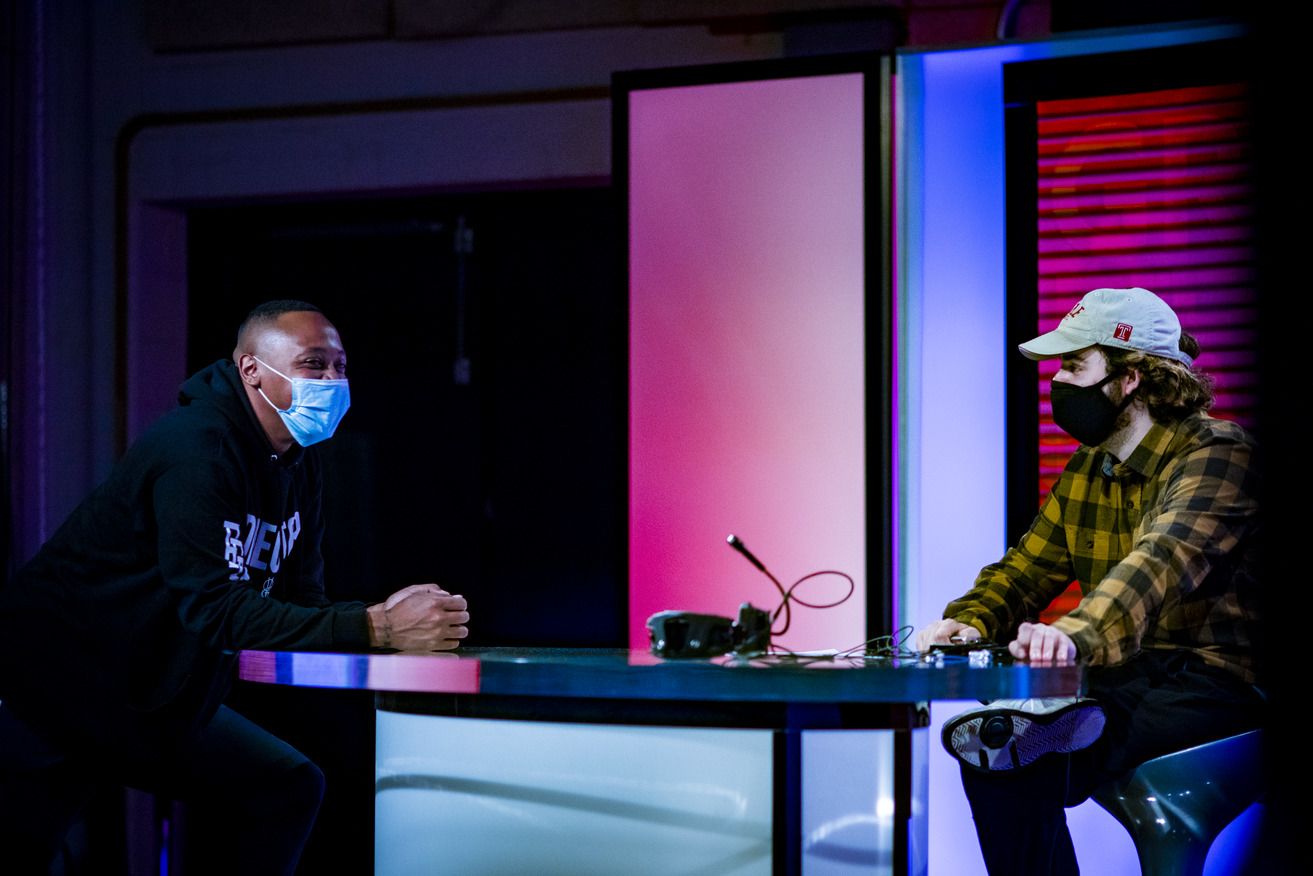
Up in the air
John DiCarlo, managing director of student media at Klein, remembers vividly the last in-person session of his Advanced Sports Reporting class in March 2020. The students finished discussing the day’s material. He told them he’d be in touch with the Zoom links. The door was open. On the other side, an upside-down world of distance and disarray waited.
“They said, ‘Do you mind if we just hang out?’” DiCarlo recalled. “I said, sure.”
The students shared their fears of not wanting to go home, and how strange the moment felt. They asked if DiCarlo had ever been through anything like this. He told them he had not. The eeriness and uncertainty of 9/11 was the closest analogy he could think of. Eventually, the students left.
At first, a sort of depression rippled across DiCarlo’s world. In addition to teaching sports writing courses, DiCarlo serves as advisor to The Temple News, The Templar yearbook and WHIP, Temple’s student-run internet radio station.
The offices for each shuttered. WHIP’s beating heart is a small space in Temple’s TECH Center. It contains a traditional on-air studio, a newsroom with several computers and a small podcasting studio carved out in the back. All became inaccessible, and the once tight-knit student crew simultaneously scattered to the wind.
“We went from a very intimate environment at WHIP with that radio vibe, three or four people sitting around a mic, to ‘Boom,’ can’t do this anymore,” DiCarlo said.
But as with other programs in Klein, the rut didn’t last long.
“A lot of the students find purpose in what they do. They find themselves in their shows, they find a voice. They didn’t want to stop.”
Students installed a digital communications platform called Discord onto their laptops. With Discord they could hold and record conversations remotely. They adapted their newsgathering techniques, learning to rely on recording telephone calls and Zoom sessions. Their interviewing skills improved as they prompted subjects to walk them through important moments and anecdotes virtually.
The changes even opened new doors and opportunities, as suddenly the students expanded their range of potential interviewees beyond the confines of Temple’s campus to those across the globe. Sports reporters had fewer games to cover, but filed important segments on how organizations like the NCAA were trying to adapt to the new world. Music journalists had no concerts to attend, but found that keeping music on the air imbued a sense of normalcy and escape.
“A lot of the students find purpose in what they do. They find themselves in their shows, they find a voice,” DiCarlo said. “They didn’t want to stop.”
Just across the street at the Howard Gittis Student Center, staff of the Templar yearbook were also learning to adapt. Co-editor-in-Chief Riley Rubiano, Class of 2022, an advertising major, said that before the pandemic, a close-knit group would meet three days a week throughout the year, handling everything from the mundane but essential task of gathering photos of thousands of students, to letting their creativity fly on feature stories encapsulating the year.
When the pandemic hit, the 2020 Templar edition was at the printers. But the press shut down, leaving thousands of incomplete copies and staff with no clue what would come next.
“We understood the frustration and confusion that students and parents had with the postponement of the yearbook, because we were just as disappointed that students were not able to see a publication our staff worked immensely hard on,” Rubiano said.
But again, students rose to the occasion. Templar staff carried their efforts on the 2020 book into the next year, working through Temple colleges to distribute it to students the following February.
For the 2021 edition, with many students unable to sit for traditional pictures, yearbook staff had to get creative. They allowed seniors who were unable to provide a photo to send a quote for use instead. With campus life sidelined, they also took to social media to hear directly from students and garner ideas for feature stories to profile.
Ultimately, Rubiano and Co-editor Leilani Henson, Class of 2021, a journalism major, worked every month from March 2020 to May 2021 to deliver both editions, while also navigating the transition to virtual coordination.
“As co-editors, we did not have the chance to have a break throughout summer 2020 as we scrambled in communication with our printing plant, representatives from the schools and colleges of Temple University, and hired new staff for the upcoming academic year,” Rubiano said. “There are still some staff members that we have not met in person due to the pandemic.”
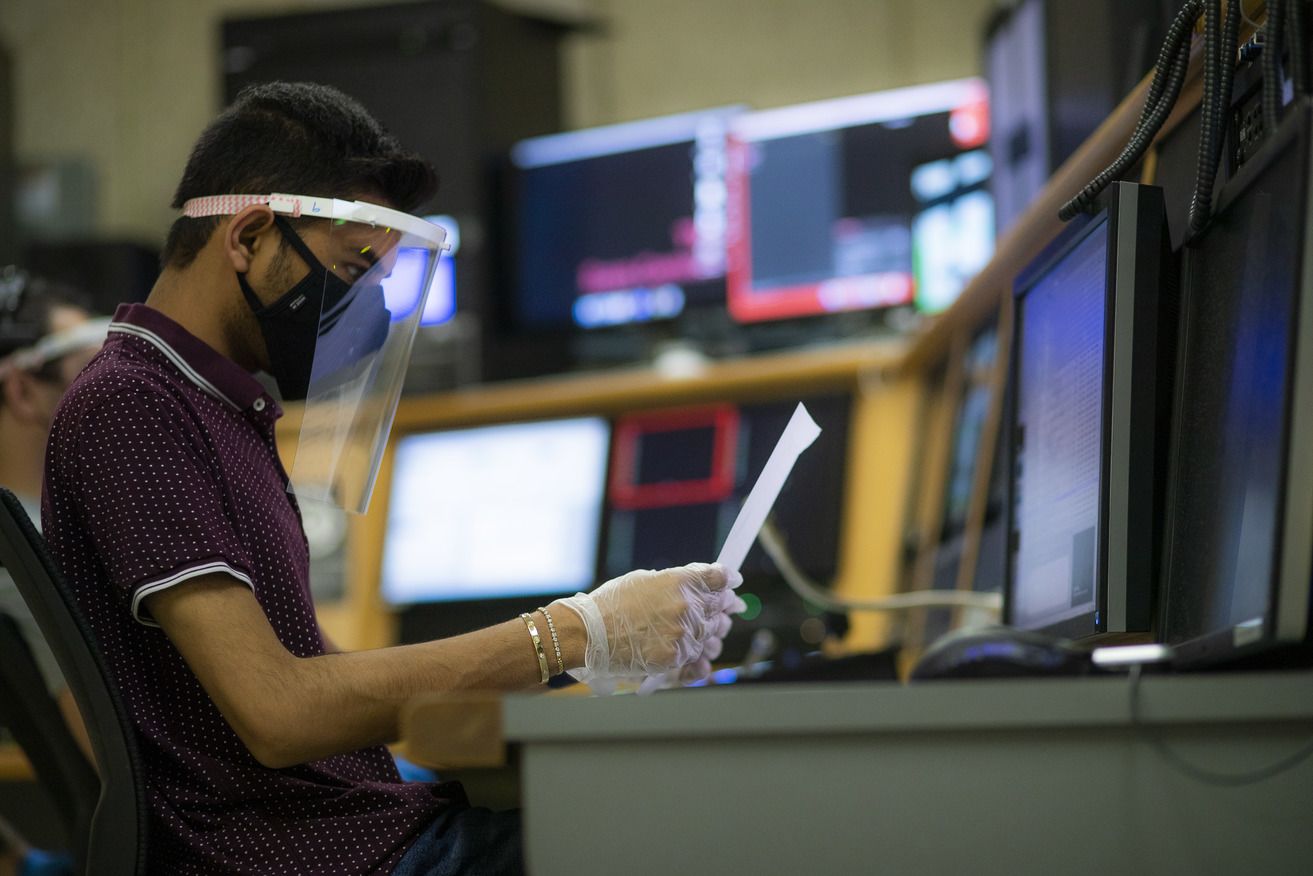
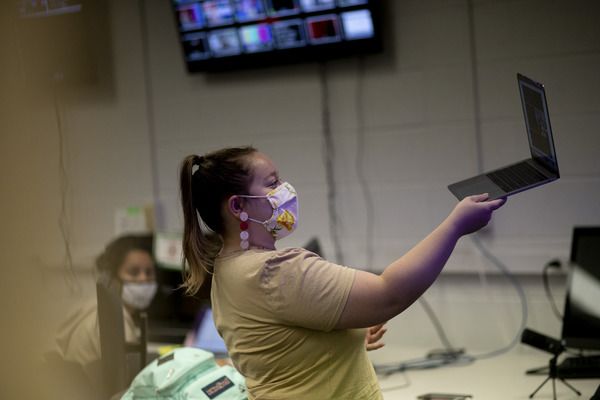
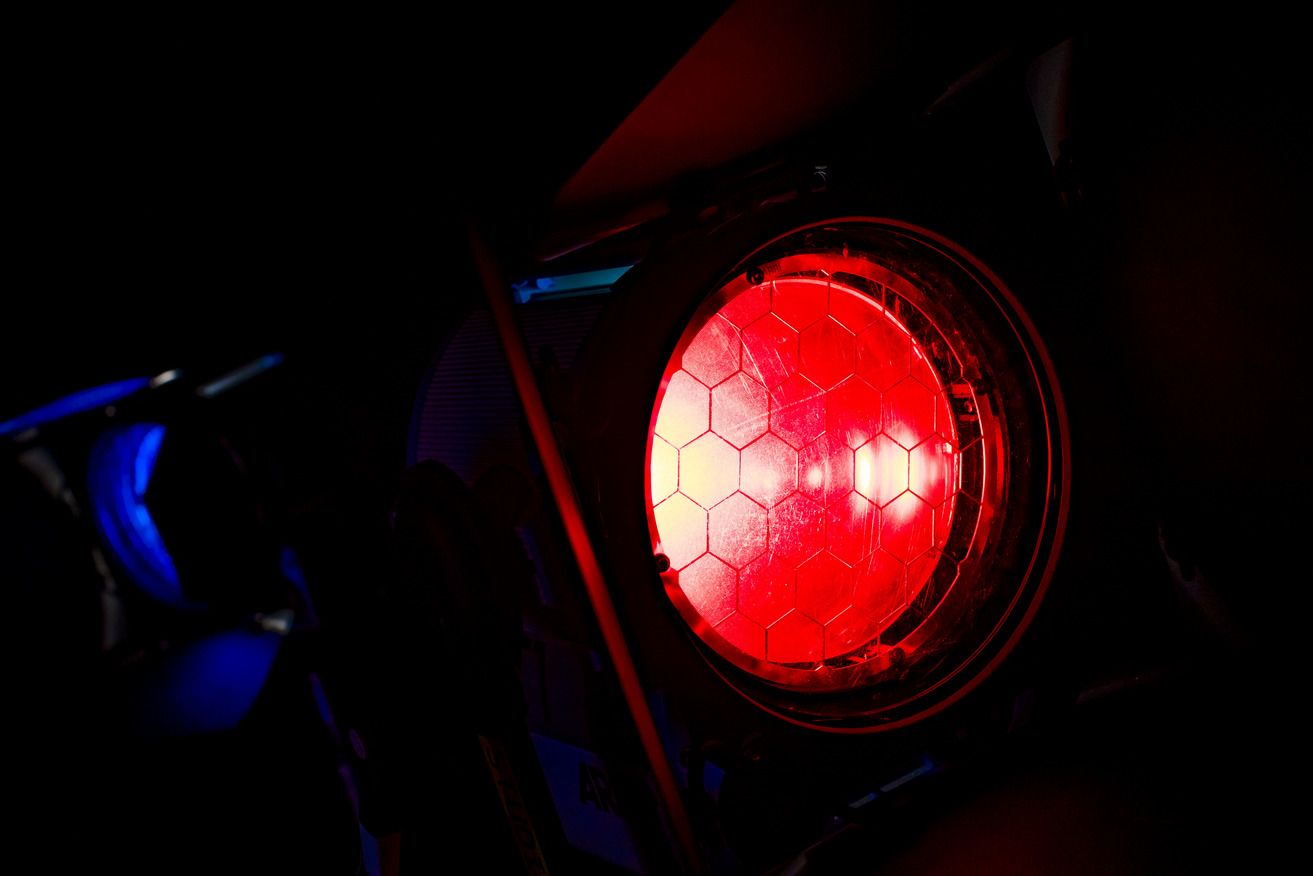
Joining forces
DiCarlo played a role in another innovation to rise from the restrictions of the pandemic. Even before the arrival of COVID-19, faculty across Klein’s programs were having conversations about the future. The college has the lowest ratio of square feet-to-students, and plans are in the works for a new, larger building that will offer bigger classrooms and an integrated media center to house facilities for various Klein programs and publications.
“We met with the editors of the various outlets and encouraged them to work together to cover this once-in-a-lifetime story. They embraced the idea, and produced outstanding work.”
Faculty were already envisioning a more interdisciplinary model, in which student journalists from The Temple News, TUTV, WHIP and others would collaborate in the new space. The pandemic provided an opportunity to perform a test run. DiCarlo, Gluck and Morgan coordinated with Assistant Professor Peter Jaroff, executive producer of weekly news show Temple Update, as well as Christopher Malo, program manager for the journalism capstone course Philadelphia Neighborhoods. Together the team launched COVID19TU.com, a central clearinghouse for all student journalism related to the pandemic.
Through the end of 2020, the website published nearly 500 pieces of content. Early stories included a March 10 piece from Temple Update on Philadelphia’s first confirmed COVID-19 case and a Temple News story from the next day on classes moving online. Nine months later, Philadelphia Neighborhoods was still filing community-focused features on the difficulty of buying homes, accessing medical care and keeping businesses afloat during the pandemic.
In the eyes of David Boardman, dean of Klein College, the effort was a success.
“We met with the editors of the various outlets and encouraged them to work together to cover this once-in-a-lifetime story. They embraced the idea, and produced outstanding work,” Boardman said, adding that the cross-collaboration should also pay dividends down the line. “The students all got the benefit of working across delivery platforms, a skill set they will need as they work professionally.”
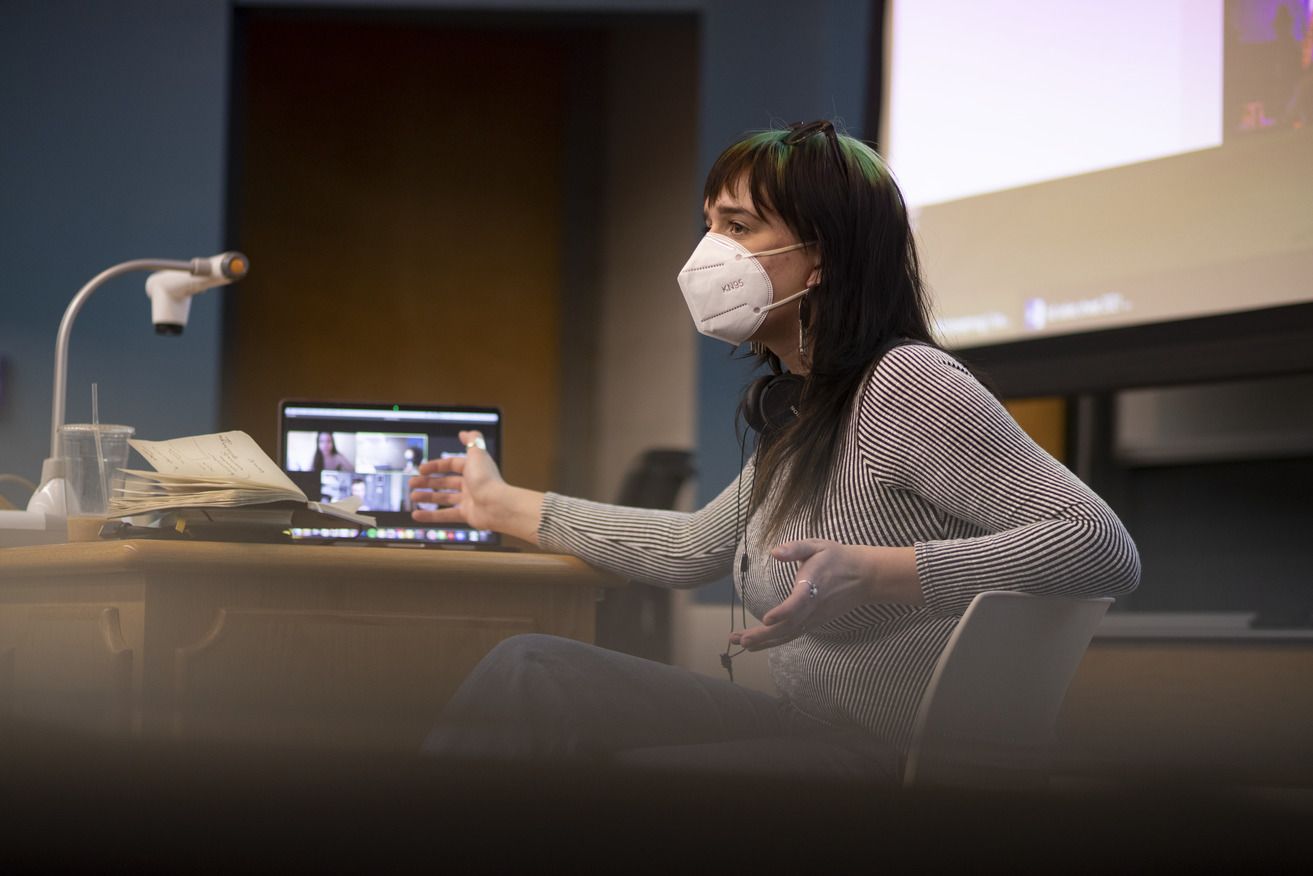
A year after she became editor-in-chief of The Temple News, Karas found herself exhausted. Late May 2021 offered her a chance to rest up for a few weeks at home in Minnesota, between the conclusion of her duties at the paper and the start of a summer internship at the Minneapolis Star Tribune.
She hasn’t yet had the time to fully recoup and reflect. But when she squints, she can already make out silver linings in the stormiest year of her life. Beyond the development of professional and leadership skills, the work meant something to her.
“It was a very 24/7, every-day role for over a year. But I think for a lot of the students, it was a point of connection,” Karas said. “Even if I was at home on my laptop for 12 hours a day, I knew I was doing something—reaching the Temple community … I don’t know how I would have gotten through the year without doing The Temple News.”
Beyond zoom
At a time when remote instruction kept students in their homes and physically distanced from their peers, Klein College of Media and Communication professors found ways to foster meaningful engagement in their virtual classrooms.
“Virtual learning offers new opportunities to connect with others that in-person doesn’t necessarily have,” explained Adrienne Shaw, associate professor in the Department of Media Studies and Production. She called on her expertise in communication theory and video games to make formerly dreaded online interactions a positive experience for all involved.
As the founder of the LGBTQ Game Archive, which seeks to document the history of lesbian, gay, bisexual, transgender and queer content in games, she is adept at finding community in the (sometimes unwelcoming) digital world. “Being open to multiple modes of interaction is something that games have done for a long time,” Shaw said. So, in her virtual classroom, Shaw emphasized discussions over lectures, kept the chat open for everyone’s use at any time and encouraged the use of emojis to convey feelings.
Betsy Leebron Tutelman, senior vice provost for strategic communications and a professor of media studies and production, recaptured the intimacy and community of the traditional classroom by hosting Zoom coffeehouses for her students.
“In a virtual classroom comprising 20 to 30 students, people who are introverts don’t often participate or just don’t feel comfortable," Tutelman explained. The coffeehouses provided a laid-back complement to the class experience and helped students become more comfortable turning on their mics and talking—about work, studies or even their personal lives.
“The important aspect was it offered another outlet for students to engage with each other and faculty,” said Tutelman. “It was a chance for students to tell their story or ask others about their stories.”
When Assistant Professor Amy Caples found out that COVID-19 concerns would not allow her to teach her popular Media Performance course in person, she decided to get creative. The college stepped in to help by purchasing a telepresence robot named “Shel”—a gender-neutral variant of “Sheldon.” Media Performance requires students to practice their on-camera performances.
Without Caples in a studio to instruct students, the course would have been nearly impossible to achieve. However, the introduction of Shel was a great solution: The course—which began exclusively online—was able to now incorporate in-person sessions.

